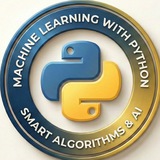Important book
50 Algorithms Every Programmer Should Know (2023)
Read it
https://t.me/DataScienceM/286
50 Algorithms Every Programmer Should Know (2023)
Read it
https://t.me/DataScienceM/286
Telegram
Machine Learning
📚 50 Algorithms Every Programmer Should Know (2023)
1⃣ Join Channel Download:
https://t.me/+MhmkscCzIYQ2MmM8
2⃣ Download Book: https://t.me/c/1854405158/148
💬 Tags: #Algorithms
USEFUL CHANNELS FOR YOU
1⃣ Join Channel Download:
https://t.me/+MhmkscCzIYQ2MmM8
2⃣ Download Book: https://t.me/c/1854405158/148
💬 Tags: #Algorithms
USEFUL CHANNELS FOR YOU
👍7❤1
Machine Learning Algorithm basics!
Support Vector Machines (SVM) vs k-Nearest Neighbors (k-NN)
#MachineLearning #algorithms #ML #DataScience #ArtificialIntelligence #AI
https://t.me/CodeProgrammer🐍
Support Vector Machines (SVM) vs k-Nearest Neighbors (k-NN)
#MachineLearning #algorithms #ML #DataScience #ArtificialIntelligence #AI
https://t.me/CodeProgrammer
Please open Telegram to view this post
VIEW IN TELEGRAM
👍8❤1
Machine Learning concepts - Intermediate Level.
Convolutional Neural Network (CNN) Layers: Convolution vs Pooling vs Fully Connected
#MachineLearning #NeuralNetwork #DeepLearning #ArtificialIntelligence #AI #Algorithms
https://t.me/CodeProgrammer🐍
Convolutional Neural Network (CNN) Layers: Convolution vs Pooling vs Fully Connected
#MachineLearning #NeuralNetwork #DeepLearning #ArtificialIntelligence #AI #Algorithms
https://t.me/CodeProgrammer
Please open Telegram to view this post
VIEW IN TELEGRAM
👍9
Important [ Python Built-in Methods ] {CheatSheet}
#MachineLearning #NeuralNetwork #DeepLearning #ArtificialIntelligence #AI #Algorithms #python
https://t.me/CodeProgrammer🐍
#MachineLearning #NeuralNetwork #DeepLearning #ArtificialIntelligence #AI #Algorithms #python
https://t.me/CodeProgrammer
Please open Telegram to view this post
VIEW IN TELEGRAM
Please open Telegram to view this post
VIEW IN TELEGRAM
👍17❤7
DS CHEAT SHEET PANDAS.pdf
2.4 MB
DS CHEAT SHEET PANDAS 🐼
#MachineLearning #Pands #DeepLearning #ArtificialIntelligence #AI #Algorithms #Python
https://t.me/CodeProgrammer🐍
#MachineLearning #Pands #DeepLearning #ArtificialIntelligence #AI #Algorithms #Python
https://t.me/CodeProgrammer
Please open Telegram to view this post
VIEW IN TELEGRAM
👍17
Understanding Probability Distributions for Machine Learning with Python
In machine learning, probability distributions play a fundamental role for various reasons: modeling uncertainty of information and #data, applying optimization processes with stochastic settings, and performing inference processes, to name a few. Therefore, understanding the role and uses of probability distributions in machine learning is essential for designing robust machine learning models, choosing the right #algorithms, and interpreting outputs of a probabilistic nature, especially when building #models with #machinelearning-friendly programming languages like #Python.
This article unveils key #probability distributions relevant to machine learning, explores their applications in different machine learning tasks, and provides practical Python implementations to help practitioners apply these concepts effectively. A basic knowledge of the most common probability distributions is recommended to make the most of this reading.
Read Free: https://machinelearningmastery.com/understanding-probability-distributions-machine-learning-python/
https://t.me/CodeProgrammer🖥
In machine learning, probability distributions play a fundamental role for various reasons: modeling uncertainty of information and #data, applying optimization processes with stochastic settings, and performing inference processes, to name a few. Therefore, understanding the role and uses of probability distributions in machine learning is essential for designing robust machine learning models, choosing the right #algorithms, and interpreting outputs of a probabilistic nature, especially when building #models with #machinelearning-friendly programming languages like #Python.
This article unveils key #probability distributions relevant to machine learning, explores their applications in different machine learning tasks, and provides practical Python implementations to help practitioners apply these concepts effectively. A basic knowledge of the most common probability distributions is recommended to make the most of this reading.
Read Free: https://machinelearningmastery.com/understanding-probability-distributions-machine-learning-python/
https://t.me/CodeProgrammer
Please open Telegram to view this post
VIEW IN TELEGRAM
👍10
This book is for readers looking to learn new #machinelearning algorithms or understand algorithms at a deeper level. Specifically, it is intended for readers interested in seeing machine learning algorithms derived from start to finish. Seeing these derivations might help a reader previously unfamiliar with common algorithms understand how they work intuitively. Or, seeing these derivations might help a reader experienced in modeling understand how different #algorithms create the models they do and the advantages and disadvantages of each one.
This book will be most helpful for those with practice in basic modeling. It does not review best practices—such as feature engineering or balancing response variables—or discuss in depth when certain models are more appropriate than others. Instead, it focuses on the elements of those models.
https://dafriedman97.github.io/mlbook/content/introduction.html
#DataAnalytics #Python #SQL #RProgramming #DataScience #MachineLearning #DeepLearning #Statistics #DataVisualization #PowerBI #Tableau #LinearRegression #Probability #DataWrangling #Excel #AI #ArtificialIntelligence #BigData #DataAnalysis #NeuralNetworks #GAN #LearnDataScience #LLM #RAG #Mathematics #PythonProgramming #Keras
https://t.me/CodeProgrammer✅
Please open Telegram to view this post
VIEW IN TELEGRAM
👍11❤3💯2
"Data Structures & Algorithms using Python"
This book of 222 pages implements all types of #DATASTRUCTURES and #ALGORITHMS. And it's💯 #FREE.
Download Free: https://donsheehy.github.io/datastructures/fullbook.pdf
By: https://t.me/DataScience4
This book of 222 pages implements all types of #DATASTRUCTURES and #ALGORITHMS. And it's
Download Free: https://donsheehy.github.io/datastructures/fullbook.pdf
By: https://t.me/DataScience4
Please open Telegram to view this post
VIEW IN TELEGRAM
Please open Telegram to view this post
VIEW IN TELEGRAM
👍12❤2
Open Guide to Data Structures and Algorithms
A must-read for anyone starting their journey in computer science and programming. This open-access book offers a clear, beginner-friendly introduction to the core concepts of data structures and algorithms, with simple explanations and practical examples. Whether you're a student or a self-learner, this guide is a solid foundation to build your DSA knowledge. Highly recommended for those who want to learn efficiently and effectively.
Read it here:
https://pressbooks.palni.org/anopenguidetodatastructuresandalgorithms
#DSA #Algorithms #DataStructures #ProgrammingBasics #CSforBeginners #OpenSourceLearning #CodingJourney #TechEducation #ComputerScience #PythonBeginners
⚡️ BEST DATA SCIENCE CHANNELS ON TELEGRAM 🌟
A must-read for anyone starting their journey in computer science and programming. This open-access book offers a clear, beginner-friendly introduction to the core concepts of data structures and algorithms, with simple explanations and practical examples. Whether you're a student or a self-learner, this guide is a solid foundation to build your DSA knowledge. Highly recommended for those who want to learn efficiently and effectively.
Read it here:
https://pressbooks.palni.org/anopenguidetodatastructuresandalgorithms
#DSA #Algorithms #DataStructures #ProgrammingBasics #CSforBeginners #OpenSourceLearning #CodingJourney #TechEducation #ComputerScience #PythonBeginners
Please open Telegram to view this post
VIEW IN TELEGRAM
❤6👍4
